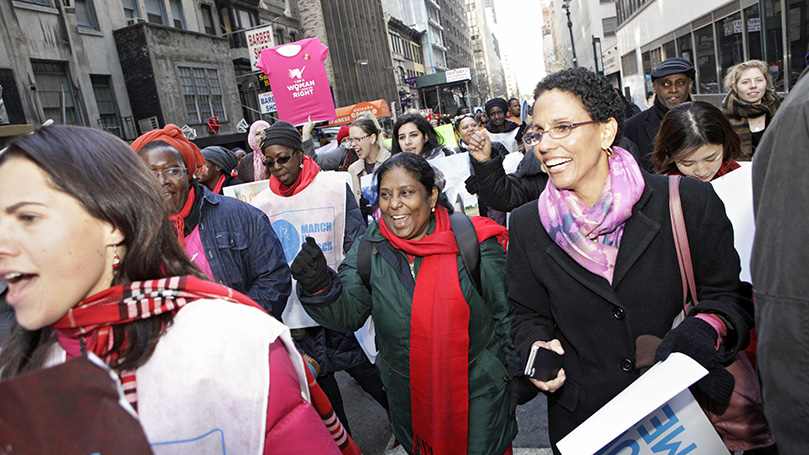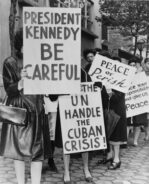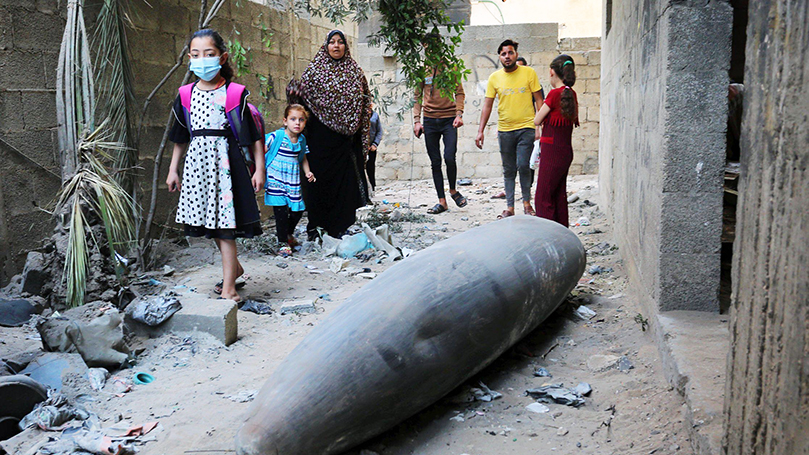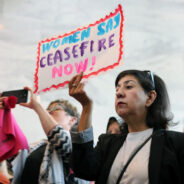
The following presentation was given at the CPUSA Peace Conference 2023, November 11-12, in New York City.
Women’s equality and working-class unity
In the Communist Party (USA) we fight for equality extended to all historically disenfranchised people, including working-class women. As we know, working-class women may hold full-time paid work, they may hold part-time work, and (fewer and fewer) some working-class women may not hold paid jobs, but work in the unpaid labor of daily and generational reproduction. Most working-class women hold paid jobs and perform the vast majority of reproductive labor for ourselves, our partners, and our young people.
When we seek women’s equality, we, as Marxists hold this complexity of paid, productive and unpaid, reproductive labor in our aspirations. In this sense, women’s equality has legal, cultural, political, and social components — but it also has an economics.
 The long and dedicated history of the united-front peace movement has always paid attention to women’s issues — true after World War I, but particularly true as the World Peace Council emerged in the wake of the nuclear bombs dropped by the United States on Hiroshima and Nagasaki, Japan, in 1945. Pro-socialist women’s organizations in the United States and the world like the Women’s International Democratic Federation, Sojourners for Peace and Freedom, the Congress of American Women, Women Strike for Peace, and Women for Racial and Economic Equality dedicated themselves to peace and women’s rights. We must remember our own progressive history in the women’s movement, since these are our movement roots. If we forget the tools and victories of our past, our history will be stolen from us.
The long and dedicated history of the united-front peace movement has always paid attention to women’s issues — true after World War I, but particularly true as the World Peace Council emerged in the wake of the nuclear bombs dropped by the United States on Hiroshima and Nagasaki, Japan, in 1945. Pro-socialist women’s organizations in the United States and the world like the Women’s International Democratic Federation, Sojourners for Peace and Freedom, the Congress of American Women, Women Strike for Peace, and Women for Racial and Economic Equality dedicated themselves to peace and women’s rights. We must remember our own progressive history in the women’s movement, since these are our movement roots. If we forget the tools and victories of our past, our history will be stolen from us.
Like women’s equality, peace and war also have an economics. We see this today: the military industry concentrates public funds, taxpayers’ dollars, into the hands of the very few: the stockholders and owners of very profitable military contractors and their subsidiary industries.
The “economics of peace” refers to creating a social fabric and relationships around the world that reinforce our shared, indeed mutual, needs for food, clothing, shelter, education, rest, creativity, joy, and well-being.
What our global peace movements over the last 100 years have taught us is that the economics of peace and war are intimately tied up in aspiring to create a tangible, lived equality for all women, particularly working-class women.
To create an economy that supports the lives of working-class women, working-class men, and working-class young people, we must shift our current war economy to a peace economy. Many of us are members of mass women’s groups for peace like Code Pink and Women’s International League for Peace and Freedom. We are also members of peace groups with strong women’s leadership like Jewish Voice for Peace and Students for Justice in Palestine. We also seek to develop the agenda for peace in mass-based women’s groups like the Women’s March, which does not currently have a strong position on this issue. We bring our pro-peace, socialist commitments to our work within these groups, to strengthen the struggle for peace and a peace economy that enriches the lives of all working-class people, especially working-class women. We seek to return to a commitment to peace across the women’s movement.
Economics of war and women’s equality
In the U.S., General Dynamics and RTX (formerly known as Raytheon) have predicted that even their four-fold increase in artillery production will not be enough to meet the demand by military conflict in Gaza, Ukraine, Yemen, Niger, Sudan, and other parts of the world.
Along with Lockheed Martin, these are the top military contractors in the U.S. Just these three companies had contract obligations of 93 billion dollars by the federal government in 2022. The next top seven companies (Pfizer, Boeing, Northrop Grumman, Humana, HLL, L3Harris Technologies, BAE Systems) had federal contract obligations of $70 billion. In 2022, the U.S. federal government spent a total of $163 billion on military contracts alone.

In 2022, the average taxpayer gave $1,087 just for federal military contracts. Four times what the same average taxpayer gave to K–12 education ($270) (National Priorities Project). Monthly Review reported that U.S. military spending is twice the officially listed statistic: in 2022, the U.S. gave $1.537 trillion dollars towards military spending. $1.57 trillion dollars is 70% of the federal government consumption and gross investment. And that percentage is on the rise.
This year, 2023, the U.S. has provided $61 billion in military funding and supplies to Ukraine. The U.S. gives billions to Israel every single year, and plans to add an additional $14 billion in military dollars to Israel in 2023.
Protesters have noticed that the economics of war destroys the lives of the living and the dead. In two of hundreds of protests against the Israeli annihilation of Gazan residents, protests outside General Dynamics weapons plant in Pittsfield, MA, and L3Harris Technologies in Northampton, MA, link military extermination and genocide to the tax-payer dollars that fund those lucrative federal contracts for fighter planes, missiles, tanks, munitions, bombs, and artillery. In Oakland, CA, 200 protestors locked themselves to a U.S. military ship to stop it from loading up weapons in Tacoma, WA, before heading off to Israel. Their actions delayed the ship for nine hours. Suquamish, Oglala Lakota, and other Indigenous activists blocked the same ship at the port of Tacoma.
 Back in 1947, the World Peace Council and the U.S. affiliates noticed another new dynamic in the economics of war, one that still exists today. At the same time that these huge military monopolies receive massive contracts from the U.S. federal government, the U.S. tax base has shifted from corporate taxes and working people’s individual taxes to a budget funded much more heavily by working people’s labor (see graph, National Priorities Project). In 1942 the amount was roughly equal at 38% — today it is vastly disparate: individual taxes fund 45% of federal revenue, and corporate taxes provide a meager 8% of total federal revenue.
Back in 1947, the World Peace Council and the U.S. affiliates noticed another new dynamic in the economics of war, one that still exists today. At the same time that these huge military monopolies receive massive contracts from the U.S. federal government, the U.S. tax base has shifted from corporate taxes and working people’s individual taxes to a budget funded much more heavily by working people’s labor (see graph, National Priorities Project). In 1942 the amount was roughly equal at 38% — today it is vastly disparate: individual taxes fund 45% of federal revenue, and corporate taxes provide a meager 8% of total federal revenue.
Federal military contractors thrive during war, and their weaponry fuels American imperialism around the world. Their wealth is our poverty.
Economics of peace and women’s equality — Overview of the Third Reconstruction Bill
On June 21, 2023, Barbara Lee (CA) and Pramila Jayapal (WA) introduced the Third Reconstruction Bill: Fully Addressing Poverty and Law Wages from the Bottom Up (cosponsored by 21 House members). The Poor People’s Campaign is the driving movement force behind a bill that imagines peace as an economics:
Drawing on the transformational history of the First Reconstruction following the Civil War and the Second Reconstruction of the civil rights struggles of the 20th century, the Third Reconstruction is a revival of our constitutional commitment to establish justice, provide for the general welfare, end decades of austerity, and recognize that policies that center the 140 million poor and low-income people in the country are also good economic policies that can heal and transform the nation.
In the Poor People’s Campaign’s Third Reconstruction program during the midterms in 2022, they shifted the focus to 43% of our population — 140 million people — those of us who are poor and low-wealth due to the greed of capitalism. This includes more than half of our children, 45% of women (74 million), 60% of Black non-Hispanic people (23 million), 64% of Hispanic people (38 million), 40% of Asian people (8 million), 59% of Native people (2 million), and 33% of white non-Hispanic people (66 million). It includes a disproportionate number of LGBTQ+ people and people with disabilities.
New research has shown that investing $100 billion towards a child allowance (similar to the expanded CTC) would generate eight times as much in current and future society-wide benefits as federal aid supporting the military or businesses.
Demands from the Poor People’s Third Reconstruction campaign that support a peace economy:
- Expanded Child Tax Credit and Earned Income Tax Credit
- Expanded Resources for Care, including child care and long-term care
- Adequate Social Welfare Programs that can guarantee adequate incomes for all, regardless of race, income, ability, gender expression, documentation, or carceral status
- Expanded, fully funded Social Welfare Programs like SNAP (Supplemental Assistance Nutrition Program), CHIP (Child Health Insurance Program), SSI (Supplemental Security Income), and SSDI (Social Security Disability Insurance)
Since we, as socialists, value all peoples’ lives, we know the solution lies in redistributing federal resources for the largest number of people to create a world where everyone can thrive. A people’s peace economy supports women’s rights at work and in their communities to live in a world made strong through peace, with full rights and bodily autonomy.
Click here for more on the CPUSA 2023 Peace Conference.
Images: International Women’s Day 2015 in NYC by UN Women (CC BY-NC-ND 2.0 DEED); Women strike for peace near the UN building (Library of Congress); General Dynamics bomb in Gaza by CorpWatch (Twitter); American Palestinian Women’s Association and Doctors Against Genocide call on all women Senators in the U.S. to call for an immediate ceasefire by CodePink (Twitter)

 Join Now
Join Now